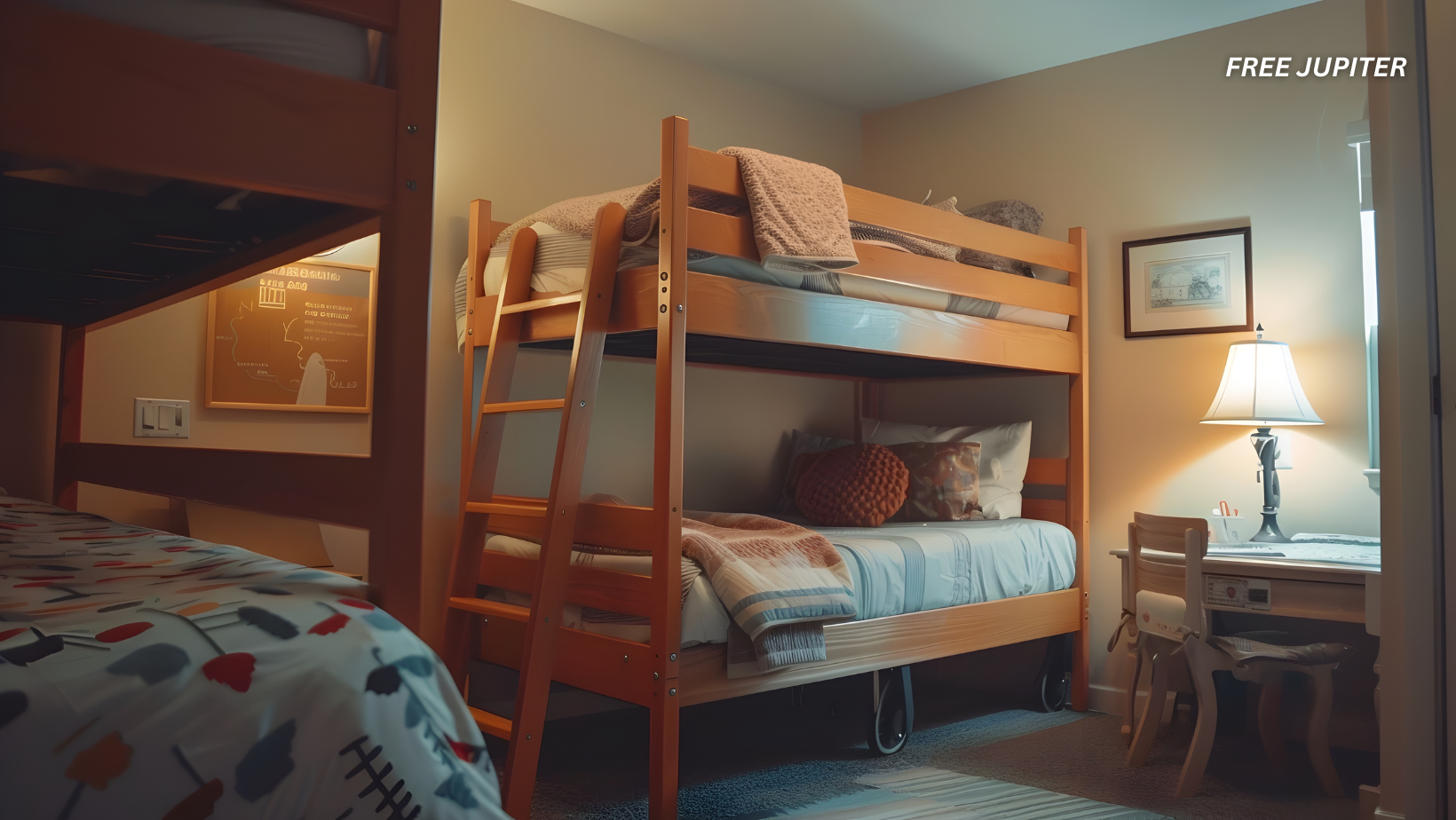For many families, childhood bedrooms were battlegrounds, bunkhouses, and bonding chambers all rolled into one. Ask a grown-up whether they once had to share a room with a sibling and the response will often split into two camps: a wistful grin, or a visible shudder that suggests lingering trauma involving bunk beds.
But psychologists point out that these seemingly ordinary childhood experiences—late-night squabbles, whispered secrets, and the endless tug-of-war over who left the light on—actually leave a lasting mark. Learning to coexist in such close quarters builds habits and coping mechanisms that echo into adulthood.
In fact, research on sibling dynamics suggests that growing up in a shared room doesn’t just test patience—it quietly shapes character. Below are nine traits that people are more likely to carry into adult life if they spent their formative years navigating a shared bedroom.
1. A Natural Talent for Negotiation
When two (or more) kids are squeezed into one room, nearly everything becomes a negotiation. Who gets the top bunk? Who claims the dresser drawer? Who decides whether the lamp stays on for reading?
This constant bargaining acts as an early crash course in diplomacy. Those nightly debates may have seemed trivial, but they were rehearsals for larger life skills. Adults who grew up this way often develop a knack for compromise and conflict resolution, having learned that digging in their heels rarely ended well. Peace, it turns out, is sometimes more valuable than being right.
Even office politics can feel easier to navigate after years of brokering deals over nightlights.
Read more: Why You and Your Siblings Might Have Lived Totally Different Lives in the Same House
2. A Flexible Attitude Toward Personal Space
In cultures that prize individual space, privacy is often seen as sacred. But those who grew up with a sibling just a few feet away quickly learned that personal space was more a privilege than a guarantee.
As adults, this often translates into being less fazed when physical boundaries blur. A crowded subway, a partner sprawling across the bed, or a friend leaning in a little too close may not trigger discomfort. Instead, people accustomed to shared rooms often developed strategies to create “mental space” even when physical space was unavailable.
Psychologists link this adaptation to greater resilience in environments where privacy is scarce.
3. Sharpened Conflict Management Skills
Arguments were inevitable in a shared bedroom. Someone always borrowed clothes without permission, snored too loudly, or hogged the blanket. Unlike disputes with friends, these conflicts couldn’t be solved by simply walking away—siblings were permanent roommates.
The unavoidable proximity forced children to cool down faster, patch things up, or learn to laugh about the absurdity of their disputes. Over time, these small reconciliations laid the groundwork for emotional endurance. Adults who had this upbringing often navigate disagreements without letting them permanently damage relationships.
Forgiveness, in these cases, wasn’t just noble—it was survival.
4. The Ability to Tune Out Distractions
One underrated superpower of room-sharers? Selective attention. Falling asleep while someone hummed, flipped through books noisily, or breathed with Darth Vader–like intensity required a mental filter.
Over the years, the brain grew adept at ignoring irrelevant noise. In psychology, this is referred to as selective attention: the ability to block out disturbances while focusing on what matters.
As adults, this comes in handy everywhere—from sleeping through hotel hallway chatter to concentrating in bustling open-plan offices. Many people who shared a childhood room can, quite literally, sleep through anything.
5. A Flair for Resourcefulness
With shared rooms came shared resources. Closet space, mirrors, desk time, even the positioning of a fan had to be divided with a sense of fairness. This constant juggling nurtured creative problem-solving.
Children in shared rooms often became adept at maximizing small spaces, inventing rotation systems, or finding hacks to make things feel equitable. That resourcefulness tends to stick, showing up later in adulthood in how they pack efficiently for trips, arrange furniture in tight apartments, or solve logistical challenges at work.
Few people can load a suitcase with the efficiency of someone who once had to share a dresser drawer.
Read more: The More Siblings You Have, The Worse Your Mental Health Is
6. A Deep Appreciation for Connection
Children who grew up in private rooms often became comfortable with solitude. By contrast, those who had a sibling beside them grew up with companionship as their baseline. For them, presence—not privacy—was the norm.
As adults, this often fosters a preference for connection over isolation. They may gravitate toward teamwork, enjoy having roommates, or feel most comfortable falling asleep with someone else nearby. Solitude is not impossible, but it may feel less natural than shared experiences.
This sensitivity to connection can make them more empathetic, especially toward people who feel left out or excluded.
7. A Flexible Approach to Routines
A shared bedroom rarely runs on one person’s schedule. Bedtimes, wake-up calls, and study habits overlap and collide. Children in this environment learn to bend their routines around someone else’s.
That constant adjustment often carries forward into adulthood. These individuals may be more adaptable to last-minute changes, better at tolerating disruptions, and more inclined to find humor in unexpected detours.
The flexibility also makes them easygoing companions in travel or relationships, where things rarely go exactly as planned. Life’s curveballs don’t tend to rattle them as much.
8. Emotional Resilience in Relationships
Living in such close proximity created constant micro-challenges. There were fights, yes, but also companionship: a sibling to whisper secrets to, to giggle with after lights out, or to lean on during thunderstorms.
This dual reality—conflict mingling with comfort—strengthened emotional flexibility. Children learned that disagreements didn’t erase love, and that frustration could coexist with connection.
As adults, this can translate into resilience in relationships. They are less likely to walk away at the first sign of tension and more willing to accept that bonds can be messy, imperfect, and still deeply meaningful.
9. A Heightened Sense of Fairness
One often-overlooked outcome of growing up in a shared bedroom is an acute awareness of fairness. Whether it was dividing shelf space, setting turns with the fan, or arguing over who got the window side, disputes often revolved around equity.
This sensitivity to fairness can carry into adulthood in subtle ways. Former room-sharers may notice imbalances more quickly—in workplaces, friendships, or partnerships—and feel strongly about maintaining equality.
While this can sometimes make them more assertive, it also reinforces integrity. Having lived in an environment where fairness was constantly negotiated, they often place high value on justice and reciprocity later in life.
Read more: Middle Children Are Better People Than Their Siblings – Why People Say That
The Bigger Picture
Not every child who shared a room turns into a flexible, easygoing adult. Some still remember the “blanket wars” with less-than-fond nostalgia, or still harbor minor grudges about who claimed the better side of the room.
But the psychological patterns are hard to ignore. Those cramped years often left behind hidden strengths: the ability to negotiate, adapt, forgive, and connect. In many ways, the bunk-bed years provided emotional training that private-room children didn’t encounter as intensely.
Whether it’s tolerating a noisy office, navigating a small apartment with a partner, or managing group travel, these early lessons continue to resurface.
Final Thoughts
Sharing a childhood bedroom was rarely idyllic. Privacy was scarce, possessions were contested, and noise was constant. Yet out of those challenges came valuable skills that endure well into adulthood: resourcefulness, flexibility, emotional resilience, and even humor in the face of irritation.
What felt like endless squabbles over lamps or drawers turned out to be quiet lessons in compromise and connection. And while not everyone looks back on those nights fondly, there is a strange kind of gratitude hidden beneath the memories.
After all, those cramped bedrooms shaped more than just childhood—they built emotional muscles that last a lifetime.
Image: Freepik.










